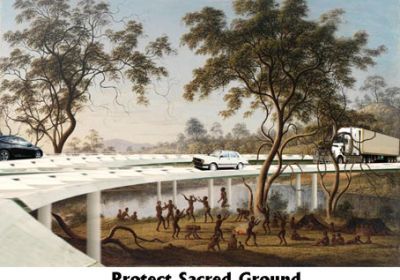
-
 Opposition to the Brighton bypass bridge over the Jordan River in southern Tasmania escalated after the April 12 decision by the Tasmanian heritage minister Brian Wightman to give final approval for works to proceed. The bridge will destroy kutalayna, a site of 42,000 years of Aboriginal occupation. On April 14, protesters entered the site and stopped the works. On April 15, 21 people were arrested after protesters scaled the fence and entered the site in waves, stopping the work on several occasions.
Opposition to the Brighton bypass bridge over the Jordan River in southern Tasmania escalated after the April 12 decision by the Tasmanian heritage minister Brian Wightman to give final approval for works to proceed. The bridge will destroy kutalayna, a site of 42,000 years of Aboriginal occupation. On April 14, protesters entered the site and stopped the works. On April 15, 21 people were arrested after protesters scaled the fence and entered the site in waves, stopping the work on several occasions. -
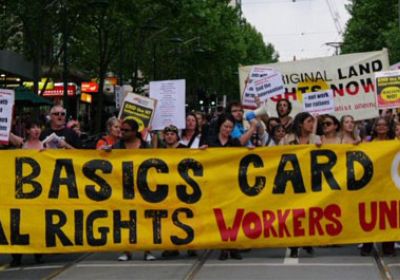 ITEC Employment and its related entity Community Enterprises Australia (CEA) are preparing a submission to the federal government that will argue “the pendulum has swung too far in favour of the jobseeker”, in relation to changes to the Community Development Employment Projects (CDEP) on Aboriginal communities, The Australian said on April 2. CEA is the largest CDEP provider in Australia. You could be forgiven for thinking that the pendulum swinging “too far in favour of the jobseeker” meant, perhaps, that people were finding work.
ITEC Employment and its related entity Community Enterprises Australia (CEA) are preparing a submission to the federal government that will argue “the pendulum has swung too far in favour of the jobseeker”, in relation to changes to the Community Development Employment Projects (CDEP) on Aboriginal communities, The Australian said on April 2. CEA is the largest CDEP provider in Australia. You could be forgiven for thinking that the pendulum swinging “too far in favour of the jobseeker” meant, perhaps, that people were finding work. -
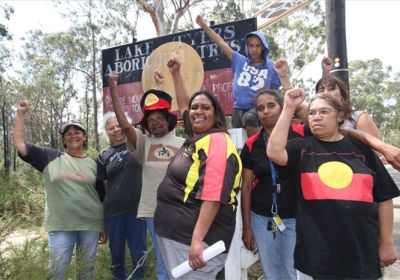 Locals from Lake Tyers, a small Aboriginal community in East Gippsland, set up a roadblock leading into their township on March 8. The action was to protest against a Victorian government-imposed administrator and call for a return to democracy in their community. The only exceptions allowed through the blockade were health service employees and school buses.
Locals from Lake Tyers, a small Aboriginal community in East Gippsland, set up a roadblock leading into their township on March 8. The action was to protest against a Victorian government-imposed administrator and call for a return to democracy in their community. The only exceptions allowed through the blockade were health service employees and school buses. -
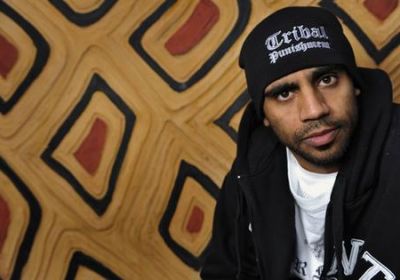
When Australian Football League player Nathan Lovett-Murray was growing up, his favourite record was “Black Boy” by Coloured Stone. “Black boy,” goes the song, “black boy/The colour of your skin is your pride and joy/Black boy/Black boy/Your life is not destroyed.” Lovett-Murray still marvels at its power.
-
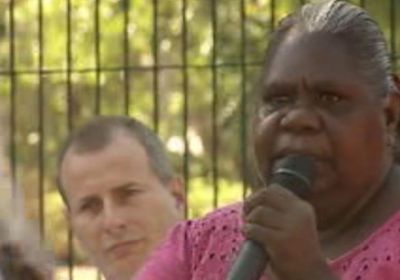 Despite crisis levels of overcrowding, many urban Aboriginal communities have been denied federal funding for new housing. On March 18, ABC online said town camps around Darwin were not allocated any of the $1.5 billion in upgrades planned for Aboriginal communities.
Despite crisis levels of overcrowding, many urban Aboriginal communities have been denied federal funding for new housing. On March 18, ABC online said town camps around Darwin were not allocated any of the $1.5 billion in upgrades planned for Aboriginal communities. -
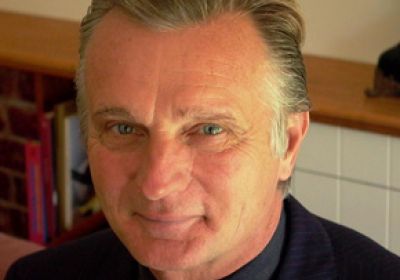 Former ABC journalist Jeff McMullen attacked the federal government’s intervention into Northern Territory Aboriginal communities as racist and harmful in a March 21 letter to indigenous affairs minister Jenny Macklin. McMullen said Macklin had “not responded to the calls by an overwhelming majority of the Aboriginal leaders in … occupied communities to end the Intervention now”. McMullen wrote in response to a letter Macklin sent him on March 2 that defended the intervention.
Former ABC journalist Jeff McMullen attacked the federal government’s intervention into Northern Territory Aboriginal communities as racist and harmful in a March 21 letter to indigenous affairs minister Jenny Macklin. McMullen said Macklin had “not responded to the calls by an overwhelming majority of the Aboriginal leaders in … occupied communities to end the Intervention now”. McMullen wrote in response to a letter Macklin sent him on March 2 that defended the intervention. -
 "There are two systems of justice in Queensland: one to protect the police service, and another to crush Aboriginal people," Sam Watson, Murri community leader, told a rally outside State Parliament in Brisbane on March 23. More than 50 people gathered to protest the decision of the Queensland Police Service and the Criminal Misconduct Commission (CMC) not to lay any charges against six police officers involved in the cover-up of the death in custody of Mulrunji Doomadgee in November 2004 on Palm Island.
"There are two systems of justice in Queensland: one to protect the police service, and another to crush Aboriginal people," Sam Watson, Murri community leader, told a rally outside State Parliament in Brisbane on March 23. More than 50 people gathered to protest the decision of the Queensland Police Service and the Criminal Misconduct Commission (CMC) not to lay any charges against six police officers involved in the cover-up of the death in custody of Mulrunji Doomadgee in November 2004 on Palm Island. -

Twenty people attended a meeting in Melbourne on March 23 organised by the Indigenous Social Justice Association (ISJA) in support of the family of TJ Hickey, a young Aboriginal man who died in February 2004 in the Sydney suburb of Redfern. He was impaled on a fence after being chased through the streets by a police car while riding his bicycle. Barrister Emrys Nekvapil told the meeting the case had been taken to the United Nations Human Rights Committee (UNHRC) by TJ's mother Gail Hickey.
-
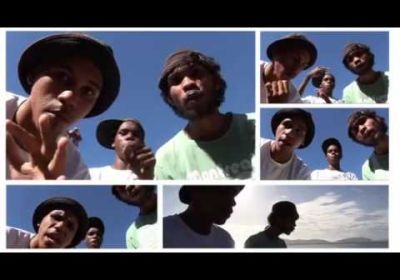
Aboriginal man Mulrunji Doomadgee died in custody at Palm Island police station on November 19, 2004. His liver had been cleaved almost in two. Nearly three years later, senior police sergeant Chris Hurley told Townsville Supreme Court he had come to terms with the fact that he caused the death.
-
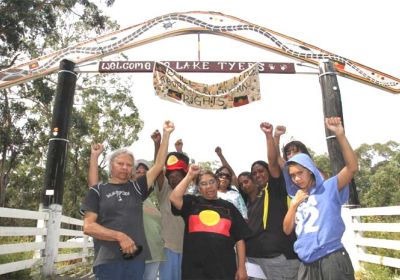 Victorian police led government officials through a blockade set up by residents of the Lake Tyers Aboriginal Trust in eastern Victoria, the Age said on March 23. Aboriginal women from the community set up the peaceful blockade on March 8 — International Women’s Day. Organisers have vowed to keep the blockade until Victoria’s Indigenous affairs minister, Jeanette Powell, agrees to meet with the community. At the start of the blockade, the women released a statement that explained their demands.
Victorian police led government officials through a blockade set up by residents of the Lake Tyers Aboriginal Trust in eastern Victoria, the Age said on March 23. Aboriginal women from the community set up the peaceful blockade on March 8 — International Women’s Day. Organisers have vowed to keep the blockade until Victoria’s Indigenous affairs minister, Jeanette Powell, agrees to meet with the community. At the start of the blockade, the women released a statement that explained their demands. -
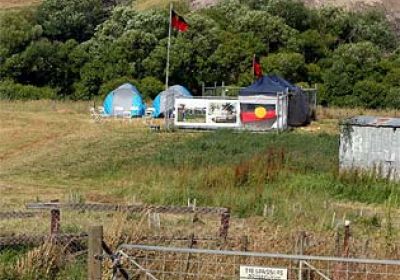 Late on March 12, a group of drunken men yelling abuse and threats of physical violence entered the site of the Aboriginal occupation of the planned Brighton Bypass in Tasmania. Trudy Maluga from the Tasmanian Aboriginal Centre described it as a “Ku Klux Klan-type” incident, the Hobart Mercury reported on March 17. “A group of Aborigines has been harassed and racially abused by a large group of drunken men and youths at the Kutalayna camp at Brighton,” Maluga said.
Late on March 12, a group of drunken men yelling abuse and threats of physical violence entered the site of the Aboriginal occupation of the planned Brighton Bypass in Tasmania. Trudy Maluga from the Tasmanian Aboriginal Centre described it as a “Ku Klux Klan-type” incident, the Hobart Mercury reported on March 17. “A group of Aborigines has been harassed and racially abused by a large group of drunken men and youths at the Kutalayna camp at Brighton,” Maluga said. -
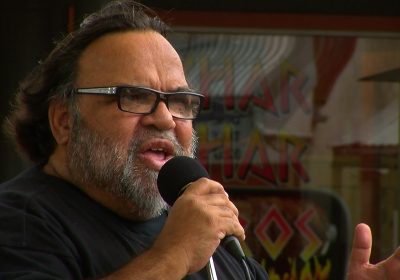 Crime and Misconduct Comission (CMC) chair Martin Moynihan said on March 15 that the anti-corruption watchdog would take no further action against police accused of covering-up the death in custody of Palm Island Aboriginal man Mulrunji Doomadgee in November 2004. In response, Aboriginal community leader Sam Watson said: “The Queensland police service have blood on their hands. This result means that the CMC [Crime and Misconduct Commission] has blood on its hands too.”
Crime and Misconduct Comission (CMC) chair Martin Moynihan said on March 15 that the anti-corruption watchdog would take no further action against police accused of covering-up the death in custody of Palm Island Aboriginal man Mulrunji Doomadgee in November 2004. In response, Aboriginal community leader Sam Watson said: “The Queensland police service have blood on their hands. This result means that the CMC [Crime and Misconduct Commission] has blood on its hands too.”